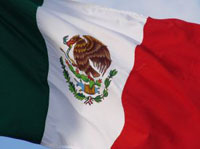Mexico is not entirely the backward, impoverished nation that popular culture would make it appear to be. The Latin American country has one of the strongest economies in the region, and most of the reports of ‘Mexicans’ waiting to cross the border don’t really refer to Mexicans, but to populations from other Latin American countries. There was a time when Mexicans did attempt to cross the border, but that time has long since passed. Today, there’s a lot of traffic flowing in the opposite direction, as Mexico has become a particularly attractive destination for American retirees.Mexico has always been a popular destination for tourists, not only those just north of the border, but from across the world.
Its pristine beaches, fascinating historical sites and amiable locals make it a popular tourist destination. In addition to the obvious holiday attractions, Mexico has a low cost of living, especially when compared to developed nations, and in spite of this, it does offer a fairly good standard of living, making it more than just a popular holiday destination. The strong Mexican economy has been booming, and with its developing economy, the country is a great place not just for working professionals, but also for budding entrepreneurs. Due to the low cost of living, expats can enjoy a rather lavish lifestyle without making too much of a dent in their budgets. It is also quite easy to get a visa and work permits for Mexico if you have the right skills.
So how does the low value of the Mexican peso against the US dollar reflect in actual prices?
Groceries
Grocery items and food and drinks are a lot cheaper, being anywhere from 10 to a 130 percent cheaper as compared to in the United States or most other developed countries. A family of four would be able to survive on an average of around USD 350 – 400. Agriculture and raising livestock is a huge part of the Mexican economy, so food costs are low. Beef is especially cheap, and is extremely popular with the locals, but poultry products and fresh fruits and vegetables can also be purchased at very low prices. Mexican beer is extremely cheap, but tequila and better quality drinks will cost a bit more.
Eating out is extremely cheap, so don’t be surprised if you start to pack on the pounds! A full meal of Mexican tacos or burritos and drinks could come for under USD 2, but if you’re looking for more exotic fine dining restaurants, you could even spend over USD 100 on a meal.
Accommodation
Rental costs in Mexico can vary greatly depending on the location and the size of the apartment or house. While you could get an apartment for as little as USD 250, the cost increases significantly in more desirable locations, especially if the region is a popular tourist destination or is simply famous and fashionable. Rents are a lot lower in smaller, lesser-known towns and cities, and the quality is often just as good.
Utilities
Prices of utilities are a good deal higher when compared to those in the United States and Europe because of a lack of competition. Power supply is poor and intermittent in some parts of the country, but is usually not problematic in cities.
Costs remain high however, as is the case with telephone service for both landlines and cellular phones. Long distance communication has become easier with the advent of internet telephony, and you could get an internet connection for around USD 20 a month, while annual subscriptions cost less.
Mexico’s water supply system is also in shambles, and although piped water is inexpensive it is not potable. Drinking water needs to be purchased and will cost you dearly.
Healthcare
Mexico’s infrastructure for healthcare services is excellent, and the country has plenty of healthcare centers and hospitals with state-of-the-art technology that provide quality care to patients. Healthcare is given a great deal of importance, and all working individuals are advised to subscribe to health insurance policies. On an average, this would cost you around USD 60 per month. In addition, policyholders are given several incentives and compensation benefits.
Transportation
Automobiles cost marginally more than they do in the United States, but public transportation is extremely cheap. The quality of public transport however leaves much to be desired. Expats who do purchase their own vehicles will find commuting to be rather cheap, as the government of Mexico heavily subsidizes the cost of gasoline and diesel – a practice that is not sustainable for the long term however.
When moving to Mexico, keep in mind that your cost of living will be largely influenced by the location you choose to settle in, the neighborhood, and your lifestyle.

